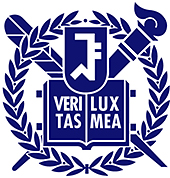Seoul National University / ソウル国立大学
|
|
|
| Number of students | TBC |
| Eligibility | Students enrolled in an undergraduate or graduate program |
| Period of study | September - June |
| Location | 1 Gwanangno, Gwanak-gu, Seoul, Korea |
| University profile | Seoul National University (SNU) is and has been the indisputable leader of advanced education in Korea since its establishment in 1946. SNU has earned this reputation by maintaining the highest standards in both teaching and research. Kwanak Campus, the main campus of SNU, accommodates four graduate schools, eleven colleges, sixty-six research institutes, and other supporting facilities. Yeongeon Campus is the medical campus which includes the University Hospital as well as other research institutes and organizations related to medical sciences. About 16,000 undergraduate students and 11,000 graduate students enroll at SNU every year. The faculty, consisting of 2,000 professors and instructors from around the world, teach students and conduct research at SNU. |
| Undergraduate programs open to exchange students | http://en.snu.ac.kr/undergraduate-programs |
| Undergraduate programs NOT open to exchange students | - College of Law: is NOT available to undergraduate level students from Spring 2018. School of Law, a specialized law school for graduate level students, instead, will be open to undergraduate students. Please note that these undergraduate students will be enrolled as graduate (Master's) students in SNU law school during their study. - Dept. of Vocal Music: restricted to students who are currently studying vocal music at home university. - College of Medicine: NO longer available to exchange students. - School of Dentistry: open only to graduate students currently enrolled in a Master's program at School of Dentistry or the equivalent at home university. -College of Business Administration: restricted to students who are currently majoring in business or economics at home university. Considering the current lack of course capacity for exchange students, CBA has decided that from Fall 2019's admission, they will strictly control the number of accepted exchange students to CBA to provide quality education and better administrative support. In this regard, it is more likely than the past that students who apply for CBA might get rejected during the screening procedure. - Dept. of Korean History/Psychology/Statistics/Pharmacy: requires applicants to provide a proof of Korean language proficiency. A satisfactory level of Korean language ability should be Level 5 or above of the official Korean Language Proficiency Test, TOPIK. -Graduate School of Business (MBA program): restricted to current full-time MBA applicants at home university. Applicants must be aware that the academic system of MBA program differs from that of other programs (Details to be individually announced from the MBA coordinator). For further information about MBA courses, please visit SNU GSB website at gsb.snu.ac.kr or contact MBA Office at mba@snu.ac.kr -Undergraduate applicants for Dept. of Computer Science and Engineering(CSE): must have earned at least 15 credits in CSE-related courses (one credit corresponds to 15 lecture hours or 30 lab hours). This must be explicitly shown on the official transcript; if not, additional proof must be prepared by the student.Starting from Spring 2020's admission, CSE has decided to control the number of accepted exchange students on the undergraduate-level, due to lack of course capacity and placement. During the screening procedure, various criteria (including GPA) could be used in determining acceptance. (Updated September 2, 2020)-Few courses of computer science (Updated August 6, 2025) |
| Graduate programs open to exchange students | http://en.snu.ac.kr/gradaute-school |
| Graduate programs NOT open to exchange students | -College of Business Administration -Undergraduate applicants for Dept. of Computer Science and Engineering - College of Law (School of Law, a specialized law school for graduate level students, instead, will be open to undergraduate students. Please note that these undergraduate students will be enrolled as graduate (Master's) students in SNU law school during their study.) - Dept. of Vocal Music is restricted to students who are currently studying vocal music at home university. - College of Medicine is NO longer available to exchange students. - School of Dentistry is open only to graduate students currently enrolled in a Master's program at School of Dentistry or the equivalent at home university. Details can be found from below |
| Minimum GPA (UG) | 2.5 |
| Minimum GPA (G) |
3.0 |
| Language of instruction |
English, Korean |
| Minimum language proficiency (UG) | ・Students who wish to take classes in Korean: A sufficient command of Korean to follow lectures (TOPIK LEVEL 5 OR ABOVE highly recommended). Applicants for Dept. of Korean History/Psychology/Statistics/Pharmacy must provide a proof of TOPIK Level 5 or above. ・Students who wish to take classes in English: TOEFL iBT 88 or IELTS 6.0 |
| Minimum language proficiency (G) | Same as above. |
| Academic calendar | FALL SEMESTER: Classes begin: Early September Classes end: Mid-December SPRING SEMESTER: Classes begin: Early March Classes end: Mid-June https://en.snu.ac.kr/academics/resources/calendar |
| Important university website for exchange students | http://oia.snu.ac.kr/ https://oia.snu.ac.kr/exchange-program |
| Scholarship information |
None provided by SNU
|
| Dormitory information | Exchange students can apply for on-campus housing, and there are two types of residence halls available on the main campus. More information: http://dorm.snu.ac.kr/eng/ |
| Other information | SNU Language Education Institute (LEI) offers credit-bearing Korean Language Programs (KLP) on a fee-paying, extracurricular basis. For exchange students taking KLP, SNU OIA will provide financial support to encourage international students to learn Korean language and culture. More information: https://lei.snu.ac.kr/mobile/en/klec/main/main.jsp |
| 塾生コメント |
▪選んだ理由は、韓国で最も知られている大学であると同時に政治学科で高い実績があるから。また、政治外交学部の中で外交学と政治学が分かれており、専門性が非常に高いといわれているので選んだ。 |


